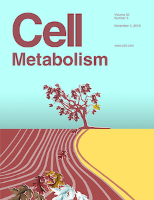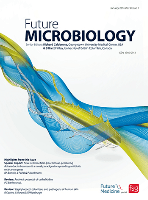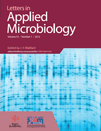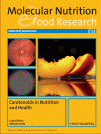
Bioscience of Microbiota Food and Health
Scope & Guideline
Championing Excellence in Microbiota Research for Public Health
Introduction
Aims and Scopes
- Microbiota and Gut Health:
Research focused on the relationship between gut microbiota and health outcomes, exploring how microbial communities influence digestion, metabolism, and immune functions. - Probiotics and Prebiotics:
Studies on the effects of probiotics and prebiotics on gut microbiota composition and health, including clinical trials assessing their efficacy in various populations. - Food-Microbiota Interactions:
Investigations into how different food components, such as fibers and bioactive compounds, affect microbiota composition and activity, and their subsequent health implications. - Microbial Ecology and Metabolism:
Research on the ecological dynamics of gut microbiota, including metabolic profiling and the impact of microbial metabolites on host physiology. - Microbiota in Disease Mechanisms:
Exploration of the role of gut microbiota in the pathogenesis of diseases, including metabolic disorders, gastrointestinal diseases, and immune-related conditions. - Clinical and Translational Research:
Focus on clinical studies that translate microbiota research into practical applications, assessing the therapeutic potential of microbiota modulation in various health conditions.
Trending and Emerging
- Gut-Brain Axis:
An increasing number of studies explore the interactions between gut microbiota and neurological health, emphasizing the microbiota-gut-brain axis and its implications for mental health and neurological disorders. - Personalized Nutrition and Microbiome:
Research focusing on personalized nutrition strategies based on individual microbiome profiles is gaining traction, highlighting the potential for tailored dietary interventions to improve health outcomes. - Microbiota in Chronic Diseases:
There is a rising interest in the role of microbiota in chronic diseases, such as obesity, diabetes, and cardiovascular diseases, with studies linking microbiome composition to disease mechanisms. - Functional Foods and Bioactive Compounds:
Emerging research on the effects of functional foods and bioactive compounds on gut microbiota modulation and health benefits is becoming a focal point, indicating a shift towards practical applications in dietary interventions. - Advanced Omics Technologies:
The use of advanced omics technologies, including metagenomics and metabolomics, to study microbiota dynamics and their functional implications is expanding, providing deeper insights into microbiota-host interactions.
Declining or Waning
- Traditional Fermentation Processes:
Research focusing on traditional fermentation methods and their microbiota has decreased, possibly due to a growing emphasis on modern biotechnological approaches and novel fermentation techniques. - Single-Organism Studies:
There is a noticeable decline in studies centered solely on individual microbial species, as the field increasingly recognizes the importance of complex community interactions within the microbiome. - Basic Microbial Characterization:
The prevalence of studies that focus solely on characterizing microbial species without linking them to health outcomes or functional implications has diminished, as more integrative approaches are favored. - Historical Dietary Studies:
Research examining historical dietary patterns and their microbiota effects appears less common, likely overshadowed by contemporary studies that address current dietary impacts and health challenges.
Similar Journals

AIMS Microbiology
Exploring the frontiers of microbiology with open access knowledge.AIMS Microbiology, published by the American Institute of Mathematical Sciences (AIMS), is an esteemed Open Access journal dedicated to advancing the field of microbiology since its inception in 2015. With an ISSN of 2471-1888, the journal aims to disseminate high-quality research and innovative findings pertaining to both fundamental and applied microbiology, encompassing areas such as medical microbiology, immunology, and related life sciences. Recognized for its academic rigor, AIMS Microbiology has achieved a significant standing, evidenced by its current Q2 ranking in both Microbiology and Medical Microbiology categories, along with impressive percentile rankings within prestigious Scopus metrics. Based in the United States, the journal not only emphasizes accessibility and widespread dissemination of knowledge but also plays a crucial role in fostering collaboration among researchers and professionals in the microbiological sciences. By providing a platform for collaborative research and innovative ideas, AIMS Microbiology is poised to influence the future development and application of microbiological research, making it a valuable resource for students, researchers, and practitioners alike.

Cell Metabolism
Fostering breakthroughs in cellular metabolism.Cell Metabolism is an esteemed journal published by CELL PRESS, dedicated to advancing the understanding of metabolic processes within cell biology, molecular biology, and physiology. With an impactful 2023 ranking placing it at Q1 in multiple categories and earning a distinguished position in the top percentiles of its respective fields, this journal serves as an essential resource for researchers, professionals, and students who are investigating the dynamic roles of metabolism in health and disease. Its rigorous peer-review process ensures high-quality publications that reflect the latest advancements in metabolic research. Since its inception in 2005, Cell Metabolism has become a pivotal platform for disseminating critical findings that not only expand scientific knowledge but also foster innovative approaches to tackle metabolic disorders. By prioritizing accessibility and scholarly excellence without the Open Access model, it remains a premier source for cutting-edge research insights.

JOURNAL OF MICROBIOLOGY
Empowering researchers to shape the future of microbiology.JOURNAL OF MICROBIOLOGY, published by the Microbiological Society Korea, is a prestigious peer-reviewed journal dedicated to the advancement of knowledge in the fields of microbiology, applied microbiology, and biotechnology. Established in 1996, this journal serves as a vital platform for researchers and professionals from around the globe to disseminate their findings and engage in multidisciplinary discussions pertaining to microbial sciences. With an H-index that reflects its impact, the journal holds a commendable Q2 ranking in key categories including Applied Microbiology and Biotechnology, as well as Medicine (Miscellaneous), which underscores its significance in the academic community. Despite being a subscription-based journal, the JOURNAL OF MICROBIOLOGY aims to contribute to the understanding of microbial processes and their applications, facilitating advancements that are essential in health, industry, and environmental sciences. Researchers, students, and practitioners are encouraged to explore this rich resource for the latest research and trends in microbiology.

FOLIA MICROBIOLOGICA
Exploring the Intersection of Microbiology and Medicine.FOLIA MICROBIOLOGICA is a distinguished academic journal published by SPRINGER, focusing on the intricate realms of microbiology and its contributions to medicine. Since its inception in 1957, the journal has been a vital platform for disseminating pioneering research, addressing contemporary challenges in the field while facilitating discourse among researchers, clinicians, and students alike. With an ISSN of 0015-5632 and an E-ISSN of 1874-9356, FOLIA MICROBIOLOGICA publishes original articles, reviews, and critical insights that span not only traditional microbiological studies but also innovative applications in immunology and biotechnology. The journal is categorized within the esteemed Q2 tier in Medicine (Miscellaneous) and holds a Q3 rating in Microbiology as of 2023, reflecting its significant impact and relevance in the scientific community. Although it does not currently offer open access, it remains a respected resource, enabling professionals and students to keep abreast of advancements from its base in the Netherlands. With a strong commitment to quality and rigorous peer-review, FOLIA MICROBIOLOGICA serves as an essential repository of knowledge, fostering the next generation of microbiologists and medical practitioners.

Future Microbiology
Transforming Knowledge into Microbiological BreakthroughsFuture Microbiology is a leading journal in the field of microbiology, published by FUTURE MEDICINE LTD in the United Kingdom. Since its inception in 2006, it has aimed to provide a comprehensive forum for the advancement of knowledge in microbiological research, particularly within the medical domain. With its current impact factor classifications placing it in Q3 for general microbiology and Q2 for medical microbiology as of 2023, it has established itself as a significant contributor to scientific discourse. The journal, featuring ISSN 1746-0913 and E-ISSN 1746-0921, actively engages researchers, professionals, and students, presenting them with novel insights and findings that enhance our understanding of microbial science. The publication is designed not only to showcase innovative research but also to foster collaborations and discussions across disciplines. While currently not offering open access, Future Microbiology remains committed to disseminating high-quality content that informs and inspires the ongoing exploration of microbiology and its critical role in healthcare.

Microbiology Research
Connecting Researchers to the Microbial WorldMicrobiology Research, published by MDPI, stands as a pivotal open-access journal in the field of microbiology, having established its presence since 2010. Based in Switzerland, this journal strives to provide a platform for innovative research and cutting-edge findings in various branches of microbiology, including medical microbiology and molecular biology. With an impact factor that reflects its dedication to scholarly excellence, Microbiology Research is classified in the Q3 category for both microbiology and medical microbiology, and Q4 for molecular biology as of 2023, indicating its growing importance and outreach within these domains. The journal aims to foster discussion and collaboration among researchers, professionals, and students by presenting articles that cover a wide array of topics and methodologies in microbiological research. Leveraging its open-access model, Microbiology Research ensures that high-quality research is accessible to a global audience, thus facilitating the advancement of knowledge and innovation in the microbial sciences.

LETTERS IN APPLIED MICROBIOLOGY
Elevating Knowledge in Applied MicrobiologyLETTERS IN APPLIED MICROBIOLOGY, published by OXFORD UNIVERSITY PRESS, is a prominent journal in the field of applied microbiology, serving as an essential platform for researchers and professionals to disseminate innovative findings. With an ISSN of 0266-8254 and an E-ISSN of 1472-765X, this peer-reviewed journal has been contributing to the scientific community since 1985 and continues to engage with cutting-edge research through 2024. With its current Scopus ranking placing it in the 45th percentile of its category, specifically at rank #70 out of 127 in the Applied Microbiology and Biotechnology field, it underscores its significance in advancing knowledge and applications pertinent to microbial science. Although it is not open access, LETTERS IN APPLIED MICROBIOLOGY offers comprehensive insights aimed at enhancing the understanding of microbiological phenomena in practical scenarios, making it a valuable resource for both seasoned experts and emerging scholars.

Probiotics and Antimicrobial Proteins
Connecting Science and Health through Microbial InnovationsProbiotics and Antimicrobial Proteins, published by SPRINGER, is a pivotal journal dedicated to the exploration and advancement of research in the fields of microbiology, molecular biology, and molecular medicine. With a strong impact reflected in its Q2 categorization for 2023 across multiple disciplines, this journal serves as an essential platform for disseminating innovative findings related to probiotics, antimicrobial peptides, and their implications in health and disease management. Spanning its converged years from 2009 to 2024, the journal provides impactful insights that cater to a broad audience including researchers, healthcare professionals, and students who are eager to explore the intersections of microbiological science and therapeutic applications. While currently offering subscription access, the relevance and quality of the published articles ensure that it remains an indispensable resource for those seeking to stay at the forefront of microbial research and its practical applications.

EUROPEAN JOURNAL OF NUTRITION
Connecting Researchers to Revolutionize NutritionEuropean Journal of Nutrition, published by Springer Heidelberg, is a premier outlet for groundbreaking research in the field of nutrition and dietetics. Established in 1996 and set to continue its impactful legacy until at least 2024, this journal enjoys an impressive recognition, holding a Q1 category rank in both Medicine (miscellaneous) and Nutrition and Dietetics, with notable Scopus rankings that place it in the top 10% of its field. The journal facilitates open access options, enhancing the dissemination of knowledge across the globe. It serves as a vital platform for researchers, healthcare professionals, and students, promoting the exchange of innovative ideas and advancements in nutritional science that aim to improve health outcomes worldwide. With a commitment to quality and relevance, the European Journal of Nutrition continues to shape the future of nutrition research and practice.

MOLECULAR NUTRITION & FOOD RESEARCH
Advancing the Science of Nutrition and Food Innovation.MOLECULAR NUTRITION & FOOD RESEARCH, published by Wiley, is a premier journal dedicated to the rapidly evolving field of food science and nutrition. With an impressive impact factor and a consistent position in the Q1 category for both Biotechnology and Food Science in 2023, this journal stands out as a leading platform for researchers, professionals, and students alike. The scope encompasses a comprehensive range of topics from molecular nutrition to innovative food research, with a focus on translating scientific insights into practical applications that enhance human health. As part of its commitment to accessibility, the journal offers open access options, allowing for wider dissemination and engagement with the academic community. Given its high ranking in Scopus—placing 42nd in Food Science and 62nd in Biotechnology—the journal plays a critical role in advancing knowledge and fostering collaboration in these essential fields. For over two decades, it has provided a vital forum for cutting-edge research, ensuring that each issue contributes significantly to the discourse around food and nutrition.